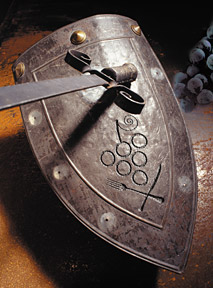Cancer Defense: The Power of Nutrition
By Dr. James Meschino
Everyone knows about the dreaded C word, and far too many have direct experience with it in one way or another. A diagnosis of cancer alone can send shock waves through an entire family, office or even a community.
And with cancer risk factors (carcinogenic foods, environmental hazards, sedentary lifestyles) on the rise, there's no better time to learn about a simple, painless step you can take to reduce your risk of developing cancer - or do your best to fight it if you've already been diagnosed. Yes, it's the power of nutrition - nature's best cancer defense.
If you haven't already heard about the book Foods That Fight Cancer: Preventing Cancer Through Diet, I strongly suggest you pick up a copy and recommend it to everyone you know. The book is authored by two leading cancer researchers, Drs. Richard Beliveau and Denis Gringas. Dr. Beliveau holds the chair in the Prevention and Treatment of Cancer at the University of Quebec in Montreal, and Dr. Gringas is a researcher in the Molecular Medicine Laboratory of UQAM-Sainte-Justine Hospital (Centre de Cancerologie Charles-Bruneau) and the University of Quebec at Montreal. Here's some of what they say about how food can fight cancer.
How Food Fights Cancer
 As stated in their book, "Nature supplies us with an abundance of foods rich in molecules with powerful anti-cancer properties, capable of engaging with the disease (cancer) without causing any harmful side effects. In many respects, these foods possess therapeutic properties on par with those of synthetic drugs". In a very precise but understandable manner, the two researchers outline the many biological targets affected by bioactive nutrients in foods that can help prevent cancer and be used in the adjunctive management of cancer. More specifically, they highlight the research showing how specific food-borne bioactive molecules can do the following
As stated in their book, "Nature supplies us with an abundance of foods rich in molecules with powerful anti-cancer properties, capable of engaging with the disease (cancer) without causing any harmful side effects. In many respects, these foods possess therapeutic properties on par with those of synthetic drugs". In a very precise but understandable manner, the two researchers outline the many biological targets affected by bioactive nutrients in foods that can help prevent cancer and be used in the adjunctive management of cancer. More specifically, they highlight the research showing how specific food-borne bioactive molecules can do the following
- Decrease free-radical damage to DNA, which is known to produce cancerous mutations;
- Strengthen immune system function, as various immune cells are known to destroy cancer cells (e.g., macrophages and killer-T cells);
- Inhibit angiogenesis (growth of new blood vessels) of developing tumors;
- Block key signal transduction pathways required for cancer cell replication;
- Stimulate pathways that induce programmed cell death (known as apoptosis) of existing and emerging cancer cells;
- Enhance detoxification, helping to neutralize and eliminate carcinogens in the body;
- Promote cellular differentiation, which decreases the risk of healthy cells from becoming cancer cells;
- Block the formation of dangerous nitrosamines (chemical compounds, some of which can cause cancer) in the body;
- Block the synthesis of dangerous forms of estrogen and testosterone, which are associated with reproductive organ cancers;
- Slow the rate of cell replication, which is a key factor in reducing the frequency of genetic mutations that may occur;
- Blocking receptor sites on cells to prevent over-stimulation of hormones and growth factors, which, in turn, slows down the rate of cell division;
- Reduce the synthesis of inflammatory prostaglandin (series-2), hormone-like chemical messengers which are also linked to increased cancer risk.
Key Cancer-Fighting Foods
In addition to reviewing the worldwide evidence on this subject, the Nutrinome Project, a project conducted in their own lab, has shown that raw extracts from certain fruits and vegetables inhibit the growth of certain cancer cells to varying degrees. Using medulloblastoma cancer cells (a very aggressive brain tumor), they showed that extracts of certain fruits and vegetables could inhibit the growth of these cancer cells in the following order: garlic, beet, kale, red cabbage, onion, turnip, cranberry, carrot, potato, squash, cabbage, and tomato.

